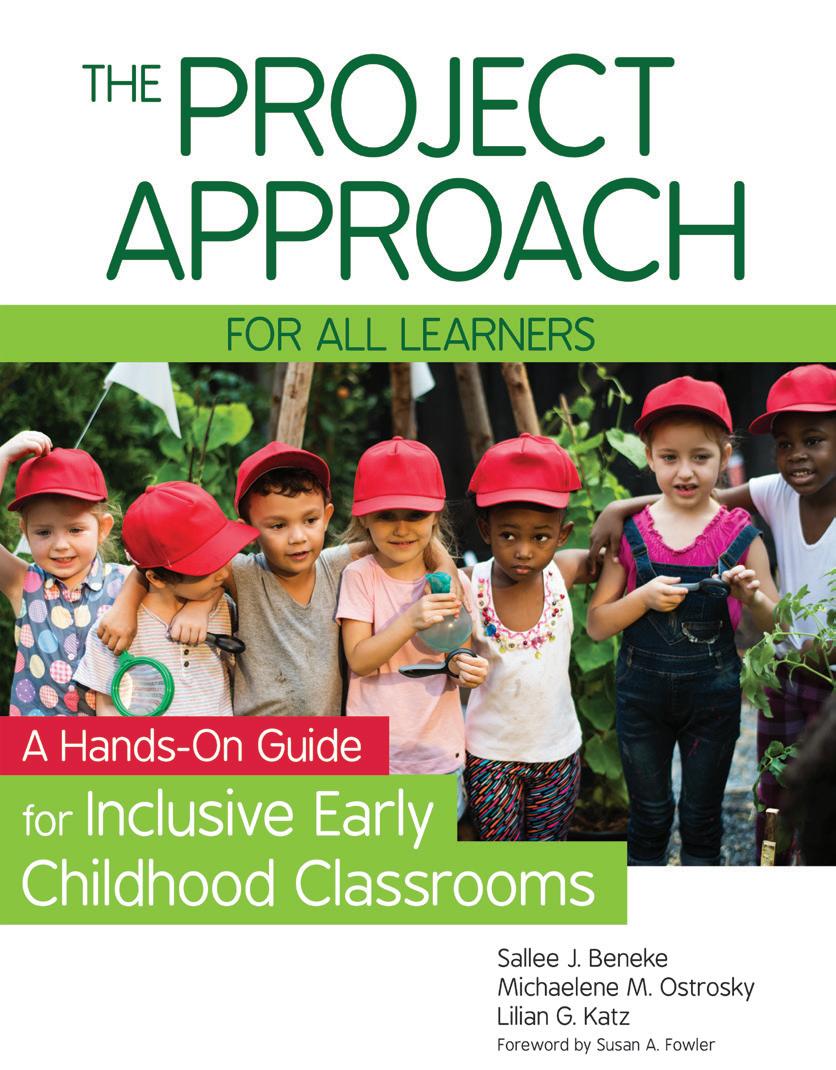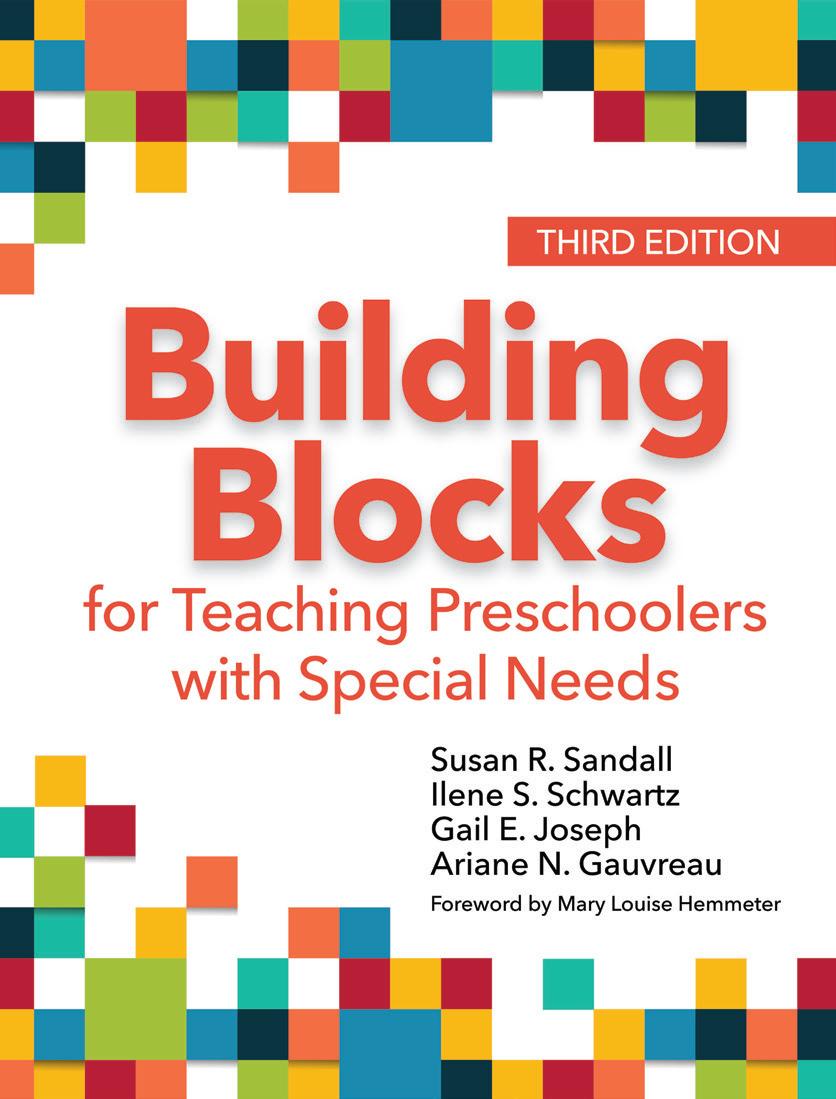
7 minute read
Appendix: The Normal Curve and Related Concepts Reading Difficulties in Bilingual Children

ORDER EXAM COPY
CONTENTS
I. INTRODUCTION AND OVERVIEW 1. Foundations of Early Intervention 2. Environmental Influences on Development 3. Early Intervention in the Context of the Developmental Systems Approach II. CHILDREN AT BIOLOGICAL RISK:
PRETERM BIRTH 4. Preterm Birth: Developmental Science 5. Preterm Birth: Intervention Science and Community Systems III. CHILDREN AT ENVIRONMENTAL RISK 6. Environmental Risk: Developmental Science 7. Environmental Risk: Intervention Science and
Community Systems IV. CHILDREN WITH DEVELOPMENTAL DELAYS 8. Developmental Delay: Developmental Science 9. Developmental Delay: Intervention Science and
Community Systems V. CHILDREN WITH AUTISM SPECTRUM DISORDER 10. Autism Spectrum Disorder: Developmental
Science 11. Autism Spectrum Disorder: Intervention Science and Community Systems VI. APPLYING THE DEVELOPMENTAL SYSTEMS AP-
PROACH TO COMMUNITY PROGRAMS 12. Advancing the System of Early Intervention
Effective Early Intervention
The Developmental Systems Approach
By Michael J. Guralnick, Ph.D. (University of Washington) After decades of rapid evolution and ground-breaking research, the field of early intervention can be understood within a common framework: the Developmental Systems Approach (DSA). Created by a highly influential leader in the field, Michael Guralnick, this evidencebased, relationship-oriented, family-centered framework focuses on strengthening the quality of key family patterns of interaction that influence a child’s development.
In this important text, Guralnick organizes and analyzes the most current research and developments in early intervention through the lens of the DSA. Starting with a clear explanation of the foundations of early intervention, the book then applies the DSA to four vulnerable populations: children at risk due to biological factors, specifically preterm birth, children at environmental risk, children with developmental delays, and children with autism spectrum disorder. Your students will discover how the DSA can guide the development of effective services and supports for diverse young children and families, and they’ll come away with insights on how to use this framework to improve early intervention programs in their own communities. An invaluable textbook for future early childhood researchers, faculty, and policy makers, this forward-thinking book is the key to establishing inclusive community-based early intervention systems that nurture each family’s strengths and promote child development.
YOUR STUDENTS WILL: • Understand the developmental science that applies to all children • Learn how child development is influenced by three critical family patterns of interaction—parent–child transactions, family-orchestrated child experiences, and parent promotion of child health and safety • Explore the influence of family resources as well as child-specific risk and protective factors on a child’s health and development in the context of early intervention • Discover ways to select interventions that are most effective for children and families based on intervention science and the DSA conceptual framework • Learn the fundamentals of applying the DSA framework to designing and implementing inclusive community-based systems of early intervention
US$89.95 | Stock #: 52889 | 2019 | 384 pages | 7 x 10 | hardcover | ISBN 978-1-68125-288-9

The Project Approach for All Learners
A Hands-On Guide for Inclusive Early Childhood Classrooms
By Sallee J. Beneke, Ph.D. (St. Ambrose University), Michaelene M. Ostrosky, Ph.D. (University of Illinois at Urbana-Champaign), & Lilian G. Katz, Ph.D. (Professor Emerita, University of Illinois at Urbana-Champaign) A proven and popular teaching method, the Project Approach engages the natural curiosity of children through in-depth investigations of topics that capture their interest. Now there’s a guidebook that shows future educators how use this child-centered approach to reach and teach all learners in their early childhood classroom—regardless of background or ability.
Developed by a team of experts that includes Project Approach leader Lilian G. Katz, this book is a complete guide to implementing project-based learning in inclusive early childhood classrooms. Future teachers will discover how to support diverse groups of children as they study realworld topics that fascinate them, play detective with peers to find answers to questions, and show what they’ve learned in interesting and creative ways. Teachers will also get practical, startto-finish guidance on how to apply the Project Approach, including a complete package of training materials, examples of successful projects from real inclusive classrooms, and a Project Approach Implementation Checklist that helps educators use the approach effectively.
LEARN HOW TO: • Use the Project Approach in combination with universal design for learning (UDL) strategies • Choose a compelling project topic that encourages hands-on learning in inclusive settings • Teach children effective strategies for investigating the topic and conducting research • Build on children’s natural motivation by actively engaging and listening to them • Make the most of each child’s individual strengths and expertise during project work • Support children in representing their learning through displays and presentations • Offer accommodations and supports that meet diverse learning needs

ORDER EXAM COPY
CONTENTS
1. Getting Started with the Project Approach 2. Defining the Role of the Teacher 3. Implementing with Fidelity 4. Supporting the Investigation 5. Representing and Sharing Project Work 6. Sustaining the Project Approach
TRAINING & IMPLEMENTATION MATERIALS: Your students will master each step of the Project Approach with the comprehensive package of supplementary materials, including the Project Approach Implementation Checklist, 38 video clips that illustrate key concepts, 22 PowerPoint presentations on important elements of the Project Approach, and six sets of training materials that correspond with each chapter. Supplementary materials are available online to purchasers of the book.

ORDER EXAM COPY

CONTENTS
I. USING THE BUILDING BLOCKS FRAMEWORK 1. Introduction 2. Evidence-Based Practice and the Building Blocks
Framework 3. Keys to Collaboration 4. Getting Started II. TEACHING STRATEGIES 5. Curriculum Modifications 6. Embedded Learning Opportunities 7. Child-Focused Instructional Strategies III. IMPORTANT TOPICS RELATED TO THE BUILDING
BLOCKS FRAMEWORK 8. Becoming More Independent 9. Acquiring and Using Knowledge: Literacy and
STEAM 10. Friendships and Social Relationships 11. Developmentally Appropriate Classroom Behavior 12. Concluding Thoughts
Building Blocks for Teaching Preschoolers with Special Needs
Third Edition
By Susan R. Sandall, Ph.D., Ilene S. Schwartz, Ph.D., BCBA-D, Gail E. Joseph, Ph.D., & Ariane N. Gauvreau, Ph.D., BCBA-D (all authors from University of Washington) Expanded with timely new content and consistent with DEC Recommended Practices, the third edition of this bestselling textbook will fully prepare a new generation of early childhood educators to teach and include every child. Like the groundbreaking previous editions, this updated Building Blocks guide gives preservice teachers three types of practical, evidence-based inclusion strategies: curriculum modifications, embedded learning opportunities, and child-focused instructional strategies. Educators will learn how to apply these three strategies for the benefit of all children; review the latest research that supports the Building Blocks model; and find ready-to-use tips and guidance on key topics, such as fostering friendships, encouraging independence, and promoting positive behavior. Reproducible forms help with planning and assessment, and seven comprehensive new training modules make it easy to teach the Building Blocks framework in college courses and professional development sessions.
NEW GUIDANCE AND TIPS ON: • Applying UDL principles to engage every student in a diverse classroom • Integrating literacy and STEAM into daily activities and routines • Supporting the executive function skills of all young learners • Applying new and expanded curriculum modifications • Collaborating successfully with other team members to ensure the best child outcomes • Conducting classroom quality assessment INCLUDES 7 TRAINING MODULES! • Using the Building Blocks framework • Conducting ongoing child assessment • Planning for the individual child • Using visuals to support learning • Applying the Building Blocks framework to math and science • Applying the framework to challenging classroom behavior • Extending the framework to infants and toddlers Each module includes a slide deck, presentation notes, learning activities, and a list of other resources and references.

ORDER AN EXAM COPY TODAY
You can request exam/desk copies of up to two books that are relevant to your course needs. If you see a book in this catalog that you’re interested in previewing, please look it up on www.brookespublishing.com, click the Request Exam Copy button found on the book’s page, and complete the request form. (All requested information must be supplied before we can process your order.)
GET COMPANION MATERIALS
The Brookes Download Hub is your home base for the online course materials— slides, test banks, sample syllabi, and more—that come with Brookes books. Sign up with your faculty email address to download companion materials, “favorite” your books to keep track of your online materials, and get free access to companion materials for ALL Brookes books. Registration is easy—sign up today! https://downloads.brookespublishing.com

Brookes Publishing Co. P.O. Box 10624 Baltimore, MD 21285-0624

PAGE 2 PAGE 3 PAGE 11



